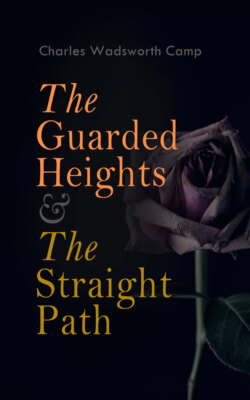Читать книгу The Guarded Heights & The Straight Path - Charles Wadsworth Camp - Страница 18
IV
ОглавлениеAbout this time one partial break in the schedule came like a strong tonic. Bailly at the close of an evening's session spoke, George fancied, with a little embarrassment.
"My wife wants to speak to you before you go."
He raised his voice.
"Martha! The battle's over for to-night."
She came quietly in and perched herself on the arm of a chair.
"I'm having a few people for dinner to-morrow," she explained. "There's one young girl, so I want a young man. Won't you help me out?"
George's elation was shot with doubt of an unexplored territory. This promised an advance if he could find the way. He glanced inquiringly at Bailly.
"Women," the tutor said, "lack a sense of values. I shall be chained anyway to my wife's ill-conceived hospitality, so you might as well come. But we'll dine early so we won't destroy an entire evening."
"Then at seven-thirty, Mr. Morton," Mrs. Bailly said.
"Thank you," George answered. "I shall be very happy to come."
As a matter of fact, he was there before seven-thirty, over-anxious to be socially adequate. He had worried a good deal about the invitation. Could it be traced to his confession to Bailly? Was it, in any sense, a test? At least it bristled with perplexities. His ordinary suit of clothing, even after an extended pressing and brushing, was, he felt, out of place. It warned him that of the ritual of a mixed dinner he was blankly ignorant. He established two cardinal principles. He would watch and imitate the others. He wouldn't open his mouth unless he had to.
Bailly, with tact, wore the disgraceful tweeds, but there were two other men, a professor and a resident, George gathered in the rapidity of the introduction which slurred names. These wore evening clothes. Of the two elderly women who accompanied them one was quite dazzling, displaying much jewellery, and projecting an air truly imperial. Side by side with her Mrs. Bailly appeared more than ever a priestess of service; yet to George her serene self-satisfaction seemed ornament enough.
Where, George wondered, was the girl for whom he had been asked?
Mrs. Bailly drew him from these multiple introductions. He turned and saw the girl standing in the doorway, a dazzling portrait in a dingy frame. As he faced her George was aware of a tightening of all his defences. Her clothing, her attitude, proclaimed her as of Sylvia's sort. He ventured to raise his eyes to her face. It was there, too, the habit of the beautiful, the obvious unfamiliarity with life's grayer tones. Yet she did not resemble Sylvia. Her skin was nearly white. Her hair glinted with gold; but she, too, was lovely. George asked himself if she would have lifted the crop, if all these fortunates reacted to a precise and depressing formula. Somehow he couldn't imagine this girl striking to hurt.
Mrs. Bailly presented him. Her name was Alston, Betty
Alston, it developed during the succeeding general conversation. He fixed the stouter of the men in evening clothes as her father and the imperial woman as her mother. He understood then that they were, indeed, of Sylvia's sort, for during his cross-country work he had frequently passed their home, an immense Tudor house in the midst of pleasant acres.
It was because of the girl that the pitfalls of dinner were bridged. In the technique of accepting Mrs. Bailly's excellent courses he was always a trifle behind her. She made conversation, moreover, surprisingly easy. After the first few moments, during which no one troubled to probe his past, the older people left them to themselves. She didn't ask what his prep was, or where he lived, or any other thing to make him stammer.
"You look like a football player," she said, frankly.
They talked of his work. He said he had admired her home during his runs. She responded naturally:
"When we are really back you must come and see it more intimately."
The invitation to enter the gates!
He fell silent. Would it be fair to go without giving her an opportunity to treat him as Sylvia had done? Why should she inspire such a question? Hadn't he willed his past to oblivion? Hadn't he determined to take every short cut? Of course he would go, as George Morton, undergraduate, football player, magician with horses. The rest was none of her business.
They were in Princeton, she explained, only for a few days from time to time, but would be definitely back when college opened. She, too, was going to be introduced to society that winter. He wanted to ask her how it was done. He pictured a vast apartment, dense with unpleasant people, and a man who cried out with a brazen voice: "Ladies and gentlemen! This is Miss Sylvia Planter. This is Miss Betty Alston." Quite like an auction.
"It must be wonderful to play football," she was saying. "I should have preferred to be a man. What can a girl do? Bad tennis, rotten golf, something with horses."
He smiled. He could impress Betty Alston, but there was no point in that, because she was a girl, and he could think of only one girl.
Yet he carried home an impression of unexpected interest and kindness. Her proximity, the rustling of her gown, the barely detectable perfume from her tawny hair, furnished souvenirs intangible but very warm in his memory. They made the portrait and the broken crop seem lifeless and unimpressive.
He forced himself to stare at Sylvia's likeness until the old hypnotic sense returned.
